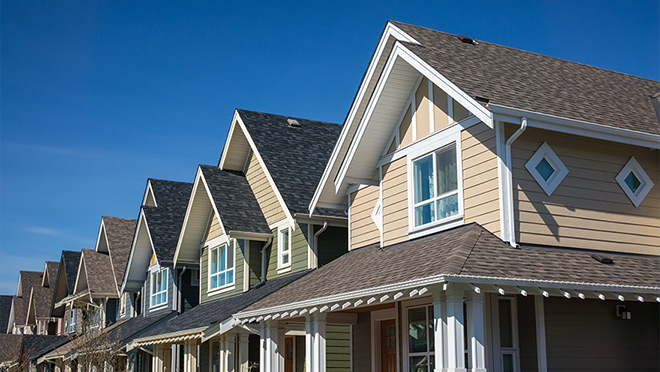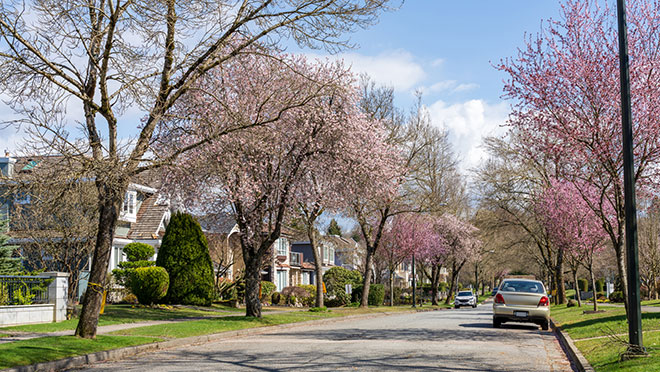February 2024

B.C.'s latest Zero-Carbon Step Code adopters
Since it was made available less than a year ago, there's been significant increase in the number of local governments referencing B.C.'s Zero-Carbon Step Code (ZCSC). In late 2023, the Township of Langley, as well as Burnaby, New Westminster, Penticton, View Royal, Esquimalt, and Colwood, became some of the most recent communities to reference ZCSC. So far, 21 local governments have new construction requirements representing a range of climate zones and population sizes throughout B.C.'s south coast, Vancouver Island, and Okanagan regions. These include:
- Burnaby
- Central Saanich
- City of North Vancouver
- Colwood
- District of North Vancouver
- District of West Vancouver
- Esquimalt
- Nanaimo
- Nelson
- New Westminster
- North Cowichan
- Richmond
- Saanich
- Squamish
- Township of Langley
- Vancouver
- Victoria
- View Royal
- Whistler
- Tsleil-Waututh Nation
- UBC campus and neighbourhood
Based on current early adoption (as of January 2024), it is estimated that 44% of all new residential units in large multi-family buildings (e.g., mid-rise and high-rise) and 30% of all new units in small residential buildings (e.g., low-rise and ground-oriented dwellings) will be built in municipalities that have already adopted the ZCSC or equivalent regulations.
Learn more about building energy-efficient zero-carbon homes
- Need a handy guide to explain B.C.'s Zero Carbon Step Code? A recently updated slide deck provides an easy-to-use introduction to what the code is, how it works, and how local governments can implement it.
- While any all-electric home will meet zero-carbon requirements, the BC Building Code will also continue to drive energy efficiency. Here's a video from Zero Emissions Building Exchange featuring homes that already meet the top step of the BC Energy Step Code: NearZero: Reaching the Top Step. The code aligns with B.C.'s target to make buildings net zero energy-ready by 2032.
- The Community Energy Association (CEA) is providing a number of opportunities for people in B.C.'s Interior to learn about the changes to the Energy Step Code and the Zero Carbon Step Code.
- How do heat pumps actually work? Here's a great visual guide from the CBC.

Legislative changes make it easier to install home EV chargers
For residents living in multifamily buildings, installing EV chargers can sometimes be challenging. In April 2023, the Government of B.C. introduced amendments to the Strata Property Act to make it easier for strata corporations and owners to install EV chargers. Changes include:
- Lowering the voting threshold from 75% to 50% approval for expenditures and changes to common and personal property that are needed to install EV chargers;
- Requiring strata corporations to obtain an electrical planning report to help understand the building's electrical capacity and plan for the expansion of EV charger infrastructure; and
- Requiring strata corporations to approve owners' requests to install EV chargers at the owners' expense, when reasonable criteria are met.
Learn more about changes to B.C.'s Strata Property Act.
EV charger rebates for apartment, condo and townhome complexes
If you're a condo owner, there are programs to help you install EV charging equipment in your building. Our programs include an EV charger rebate offer, as well as EV Ready rebates, which help subsidize the cost of planning and installing the necessary electrical infrastructure to support your current or future EV charging needs.
By taking advantage of EV Ready rebates, you can reduce the cost per parking space for installing EV chargers (versus only installing a few chargers at a time), and it greatly simplifies the process to install additional chargers as more EVs are adopted over time. Getting a building EV ready is quickly becoming the preferred approach for condo residents to ensure their building is prepared for high levels of EV adoption. Condos and apartments looking to install EV chargers can also get up to five hours of free advice and planning assistance from an expert in EV charging and equipment.
Learn more about our EV charger rebates for apartment, condo and townhome complexes.
Rebates for EV power management devices
People living in single-family homes and duplexes are more likely to have access to a parking space, making EV charging installation in these settings relatively simple. However, in some cases, homes may not have much electrical capacity remaining, and the electricity to power an EV charger might overload their system. Good news: in many of these cases, there are cost-effective EV power management devices that can manage the electrical load from EV chargers, helping homeowners avoid the cost of an electrical service upgrade.
BC Hydro is providing a rebate of $200 for eligible single-family home customers who need to install an EV power management device to avoid electrical service upgrades when installing a Level 2 EV charger at home.
Learn more about our rebates for EV power management devices.
Want more tips on avoiding an electrical service upgrade for your home?
Check out this slide deck [PDF] from BC Hydro's Tim Mosley's recent webinar. In addition to discussing load-share devices, the slides share info on how to go on a Watt Diet, install smart panels, and more.

New optional electricity rate plans coming soon
The way our customers use electricity has changed a lot over the years, and the rate plans we offer to customers need to evolve to meet their diverse needs.
In December 2023, our optional residential time-of-use rate and the transmission service rate were approved by the B.C. Utilities Commission (BCUC).
The optional time-of-day pricing will offer residential customers a way to save on their bills if they can shift some of their usage from times of peak demand on electrical system to times of the day when our system has more available capacity.
The new transmission service rate removes an electrification barrier by eliminating the current complex, tiered default rate and sending price signals that better reflect the cost of delivering service.
Other rate applications and next steps
We're also expecting a decision from the BCUC on our public EV charging service rate soon. We've applied to offer a by-kilowatt-hour rate for our public EV chargers, which currently charge by time.
We're looking at filing further rate design applications in the summer of 2024. These applications will include updates to:
- The current two-tier Residential Conservation Rate, as well as proposals for other optional residential rates.
- The net metering rate.
- The Electric Tariff terms and conditions, including updating the distribution extension policy.
Over the next few months, we'll continue to engage with customers on the design of these rates and changes. To learn more and keep up with ways to get involved, see our current rate design activities.

Meet the City of Port Moody's new community energy manager
Join us in welcoming Chris Brown, the newest member of our community energy manager (CEM) network.
Originally from the UK, Chris previously worked in a similar role at Hammersmith & Fulham Council (part of the metropolitan area of London) and Herefordshire Council on climate action projects and policy including food waste anerobic digestors, an e-cargo bike courier service, a "Library of things", bike share scheme, solar car ports and shared ground-source heat pump trials.
In Port Moody, Chris hopes to bring his expertise in researching and implementing innovative heat pump projects. He notes that electrical rates are much cheaper in British Columbia than in the UK, bringing significant cost saving advantages for customers who electrify here.
Port Moody requires all new buildings to be EV-ready and is also working with BC Hydro to get more public charging infrastructure installed in community areas. In his previous role working in the dense city of London, Chris project managed integrating EV chargers into street lighting to make use of the limited street space.
As a new member of our community energy manager network, Chris looks forward to sharing knowledge with other CEMs, learning about the policy designs other local governments are implementing, and keeping an eye out for opportunities to share knowledge and best practices. He adds that "it's nice having a support network around you so you don't feel like you're on your own."
In his spare time, Chris loves spending time outdoors. He's an avid snowboarder and also enjoys mountain biking, hiking, camping, and "trying to save nature so we can get out and enjoy it."
Our community energy manager program provides funding for local governments to hire sustainability professionals and advance their clean energy initiatives.

Quick links from around our community
We get lots of questions on how BC Hydro is preparing for widespread electrification. Here are three new ways to learn more how we'll meet future electricity needs:
- The Government of B.C. recently announced an unprecedented level of investment over the next 10 years to sustain and expand our electricity system as set out in our 10-year Capital Plan. Our plan contains $36 billion in community and regional infrastructure investments across B.C. and represents an increase of about twice the investment over our previous 10 years of capital spend, excluding Site C. As electrification ramps up, B.C. is well positioned to lead the way as our electricity grid is already one of the cleanest in the world – but to meet the scale and pace of what's required, we need to invest in our local and regional infrastructure.
- Join us in person at the Vancouver Convention Centre on February 14, 2024 at 10:30 a.m. for a panel on "Is British Columbia Ready for Electrification?" with BC Hydro's Jacqueline Spray, Aaron Ellis, and Alex Tu. The panel is part of BUILDEX, Western Canada's largest forum connecting the holistic building industry.
- Listen to the recording of our recent webinar with B2E, Is B.C. Ready for Electrification?, now available as part of ZEBx's podcast series.
We're gearing up to fund another round of UBC Sustainability Scholars. This successful long-running program places graduate students with partner organizations to do specific research projects that advance low carbon electrification and market transformation, fostering a new generation of professionals. Learn more about the program and view past projects.
Join Plug In BC for a forum on March 6, 2024 at the Pipe Shop venue in North Vancouver to experience the newest electric fleet vehicles, hear about the benefits and opportunities of fleet electrification, and learn about the CleanBC Go Electric rebates available to businesses and consumers. This event is geared towards West Coast Electric Fleet members, regional and municipal representatives, business members, original equipment manufacturers, infrastructure partners, suppliers, EV educators and advocates. Register here.